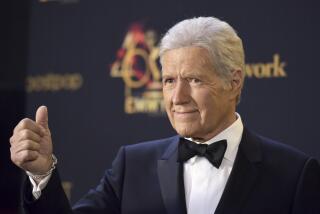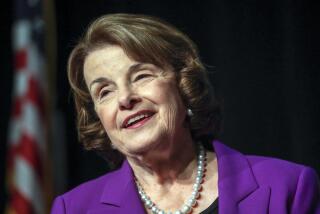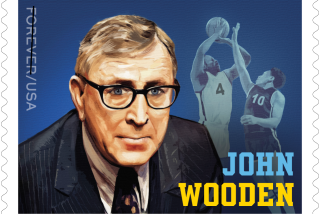Stamp to Fund Research on Breast Cancer
- Share via
The U.S Postal Service will unveil a new stamp in Los Angeles today that is intended to aid the fight against breast cancer by earmarking for the first time a share of sales proceeds for research.
The new stamp comes as a result of efforts by a Sacramento physician and a woman who lost a breast to cancer and now heads a Covina-based organization that assists those with the disease. Together, they convinced Congress to pass the necessary legislation.
The 40-cent stamp will function like a regular 32-cent, first-class stamp. The extra 8 cents from each stamp will be turned over to breast cancer research programs of the National Institutes of Health and the U.S. Department of Defense, which conducts cancer research.
“Literally, stamp by stamp, penny by penny, the American people can raise millions of dollars a year,” said Elizabeth Mullen, 39, founder and CEO of the Covina-based Women’s Information Network Against Breast Cancer.
The Postal Service has been reluctant to issue such stamps and the idea was opposed by some stamp collectors, who complained that a surcharge was an unfair tax imposed on their hobby.
“We never wanted to be in a position of picking which charity [would benefit],” said post office spokesman Don Smeraldi.
Smeraldi said the Postal Service will have to devise a system for tracking sales of the new stamp.
Although the stamp will not be sold until August, its design will be publicly revealed this morning at the Los Angeles Memorial Coliseum, where tens of thousands are expected to participate in the fifth annual Revlon Run and Walk for Women. The event is dedicated to women’s health and breast and ovarian cancer awareness.
The stamp is a line drawing of a woman’s upper body with the words “Fund the fight. Find a cure.”
The post office agreed to print at least 100 million of the stamps during a two-year test run, according to Smeraldi. Congress permitted the Postal Service to add a surcharge of up to 25% of face value for the special issue.
Mullen said the idea for the stamp came from Sacramento surgeon Ernie Bodai, who specializes in breast cancer surgery. “He called me one night after he had performed three mastectomies and said we have to do something,” said Mullen, who lives in San Diego.
A naturalized American citizen, Bodai, 47, fled Budapest, Hungary, with his parents during the anti-Soviet revolution of 1956 and spent a year and a half in refugee camps before entering the United States.
“I’ve learned government can be very responsive,” said Bodai, who chuckled as he recalled relying on an eighth-grade civics textbook to plan his stamp campaign.
“I was really getting frustrated,” he said. “The chances of dying from this disease are the same now as they were mid-century.”
To start, Bodai wrote the Postal Service with his stamp idea and got a rejection notice, he said. He then enlisted help from Mullen.
The two Californians repeatedly prowled the halls of Capitol Hill looking for support for their idea, hoping that a congressional bill could force the Postal Service into action. “What I was doing without really realizing it was becoming a lobbyist,” Bodai said.
More to Read
Sign up for Essential California
The most important California stories and recommendations in your inbox every morning.
You may occasionally receive promotional content from the Los Angeles Times.













